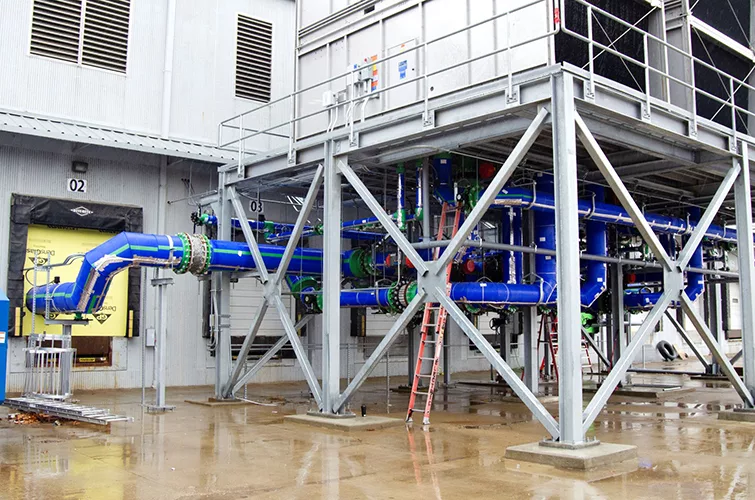In November 2022, tens of thousands of hand-shaped glove molds started to move around a handful of assembly lines at American Nitrile in Columbus, Ohio. The facility had officially started up for a test run of its largely automated process to create nitrile gloves for medical and scientific purposes.
And an intricate network of expertly fused Aquatherm polypropylene piping is helping the business accomplish its goal.
In 2021, American Nitrile was founded by an ownership group whose aim was to address problems brought to the forefront by the Covid-19 pandemic; namely, the growing need for domestically produced medical supplies that would not be as affected by global supply chain issues. Since 2020, demand for nitrile gloves has surged, resulting in critical shortages nationwide.
But in the medical field, work can’t slow or stop when personal protective equipment is hard to come by because of increased demand or bottlenecks at ports. And with more than 99% of nitrile gloves coming from overseas, particularly Malaysia and the Asia Pacific region, the glove market has been especially impacted.
That’s a statistic that American Nitrile is poised to change. Already, American Nitrile has strong interest from a multitude of customers, highlighting the demand for medical supplies produced within the United States.
Once it’s fully operational, American Nitrile will supply nitrile gloves for the medical, research and industrial sectors. Nitrile gloves are more rugged and puncture-resistant than latex, and do not have the same risks of allergic reaction posed by latex gloves.
Automating Production
One challenge faced by American Nitrile came in the form of cost. Nitrile gloves produced overseas are generally less expensive than gloves produced domestically. To compete with overseas production, American Nitrile emphasized automation throughout the production process. In addition, the shipping costs are greatly reduced since they’re not crossing oceans to reach customers in the United States.
The 12 production lines will be able to produce 40,000 gloves per line, per hour – or about 3.6 billion gloves each year.
Before the production could even begin, though, the facility’s infrastructure had to be installed. In addition to the machinery that makes up the production lines, there are about 2.5 miles of polypropylene piping threaded through the 527,000-square-foot building.
“We decided to use polypropylene because of the lead time and cost factor,” says Alex Mallison, American Nitrile’s engineering manager “We were able to get polypropylene pipe much more quickly than copper, steel or aluminum pipe. And we realized that our guys could fuse polypropylene in half as much time as it would have taken for other pipe materials.”
The pipe serves a number of purposes, from running chilled water to and from an enormous chilling tank on the exterior of the building, to servicing the chemical tanks used in the gloves’ coating. As they travel along the production lines, the molds are dipped into vats of chilled liquid nitrile, then baked in ovens. As the nitrile is heated, it conforms to the shape of the hand mold.
Fusing Miles of Pipe
With literal miles of polypropylene to fuse, and with a goal of beginning operations in 2022, crews would need plenty of fusion equipment. Morain Sales and Service, a licensed contractor supplier based just outside of Youngstown, Ohio, provided almost a dozen pieces of McElroy equipment for the job.
“At Morain, we’re used to accommodating for projects that have large scopes like we saw with American Nitrile,” says Pat Sims, outside sales representative at Morain. “Considering the amount of polypropylene piping that was being installed, we knew that they would need multiple machines to get the job done.”
Morain provided contractors with a pair of Spider 125 machines, allowing for quick and efficient socket fusion of the polypropylene pipe and fittings being used at American Nitrile. McElroy’s Spider is unique in that it allows for a single operator to align, heat, fuse, and cool the pipe without assistance. The Spider is ideal for tight applications because of its lightweight and compact design, making it perfect for the cramped quarters that make up the network of pipe running through the facility.
To butt fuse the pipe, which ranged from 3 to 24 inches in diameter, four McElroy Acrobat fusion machines were provided: an Acrobat 160, two Acrobat 250 machines, an Acrobat 315, and an Acrobat with QuikFit carriage.
Like the Spider, Acrobat machines are able to fuse in any orientation, making them the preferred method for overhead and vertical installations that are common in indoor applications. Operators were able to quickly move the Acrobats from one fusion site to another, streamlining the fusion process and demonstrating polypropylene’s ability to be quickly and efficiently installed when compared to traditional copper or aluminum.
Acrobat QuikFit carriages, in sizes ranging from 355mm to 400mm, 450mm to 500mm, and 560mm to 630mm, were used to fuse the larger pipe, especially the 24-inch pipe that serviced the large chilling tank. The QuikFit’s innovative carriages are size-specific and composed of lightweight, modular components so that the upper and lower jaws can be assembled around the pipe by hand, eliminating the difficulty of lifting and fitting entire carriages into a small space.
“Seeing the level of productivity that resulted from the fusion machinery really reinforced our decision to go with polypropylene in the first place,” Mallison said.
Likewise, Sims said he was happy to see Morain – and McElroy – play a part in a project that will go on to positively affect the lives of millions of people.
“The demand for medical equipment isn’t going away any time soon,” Sims said. “Being able to be involved in something that will be able to help others is very satisfying.”
Larissa Copeland is public relations Specialist for McElroy Manufacturing in Tulsa, Oklahoma. She can be reached at [email protected].




